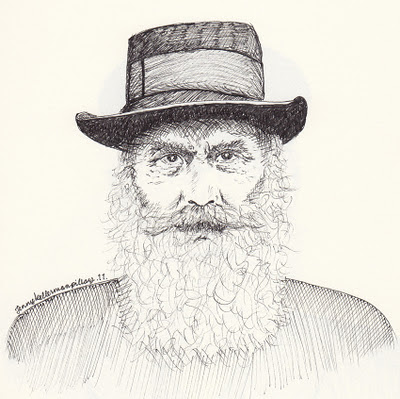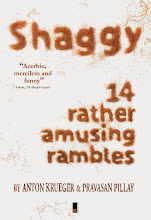Sunday, October 30, 2011
Friday, October 28, 2011
Thursday, October 27, 2011
Wednesday, October 26, 2011
Linda Stenman on Shaggy
Shaggy (BK Publishing, 2011) is a collection of amusing monologues from South African writers Anton Krueger and Pravasan Pillay. In each text, a - how shall I say this - not so successful individual speaks to co-workers, audiences and comrades.
After reading a couple of texts, you notice that you begin every new chapter with thinking, "no, not another one!". Loser, that is. Let's face it - the characters in this book impress no one but themselves. But it makes a funny book. My favourites are "The Actress" and "The Foreword" (I'm a huge fan of footnotes). My rating is four stars for some of the stories, and three for others.
I say: ***(**)
First published on Linda Loves Books
After reading a couple of texts, you notice that you begin every new chapter with thinking, "no, not another one!". Loser, that is. Let's face it - the characters in this book impress no one but themselves. But it makes a funny book. My favourites are "The Actress" and "The Foreword" (I'm a huge fan of footnotes). My rating is four stars for some of the stories, and three for others.
I say: ***(**)
First published on Linda Loves Books
Tuesday, October 25, 2011
Victoria Williams: 0126
You tried to sober me up by taking me to funerals. But then I started lighting cigarettes for the choir boys, from the altar candles.
Sunday, October 23, 2011
Friday, October 21, 2011
Thursday, October 20, 2011
Eclectic mix of local short stories, by Janet van Eeden
Book of the Week: The Cream of South African Writers
The editor of this eclectic collection of short stories, Arja Salafranca, sifted through over 100 submissions before she chose stories from the cream of South African writers. There was no theme as such, but it seems as if the stories chosen examine people who are in extreme situations,emotionally or physically.
For example, Arja Salafranca’s moving story about a woman forced to live in a restrictive apparatus in “Iron Lung” is a million miles away stylistically from Aryan Kaganof’s tale of decadence and debauchery on a night out in Durban in “Same Difference.” What is similar, though, is both stories deal with someone in extremis. The narrator of Kaganof's story is the edge of the emotional abyss. The young woman watching her mother in "Iron Lung" is too. There is no easy way to contemplate a happy future when someone you love is crippled in this way.
There are many gems in this sparkling collection. The enjoyment comes not only from the juxtaposition of many different writers, but also from reading stories with such a variety of subjects.
For example, Liesl Jobson’s “You Pay for The View: Twenty Tips for Super Pics” is a series of verbal snapshots of pivotal moments of a mother trying to find a connection with her children. It is written with poignancy and deep longing. “Doubt” by Gillian Schutte is a study of how passion can seep out of a marriage once the chase is over and when feelings of irrelevance grow due to being part of a couple.
Jenna Mervis’s “The Edge of Things” explores paranormal paranoia in a tangible way and examines the valid fear women feel on a daily basis.
The eternal clash with “the other” is explored in Gail Dendy’s “The Intruders”. Perd Booysen’s “Sinners and Sinkholes” is a delightful modern-day Hermann Charles Bosmanesque tale of ghost towns and gullibility in the arid wasteland of the Karoo.
The editor of this eclectic collection of short stories, Arja Salafranca, sifted through over 100 submissions before she chose stories from the cream of South African writers. There was no theme as such, but it seems as if the stories chosen examine people who are in extreme situations,emotionally or physically.
For example, Arja Salafranca’s moving story about a woman forced to live in a restrictive apparatus in “Iron Lung” is a million miles away stylistically from Aryan Kaganof’s tale of decadence and debauchery on a night out in Durban in “Same Difference.” What is similar, though, is both stories deal with someone in extremis. The narrator of Kaganof's story is the edge of the emotional abyss. The young woman watching her mother in "Iron Lung" is too. There is no easy way to contemplate a happy future when someone you love is crippled in this way.
There are many gems in this sparkling collection. The enjoyment comes not only from the juxtaposition of many different writers, but also from reading stories with such a variety of subjects.
For example, Liesl Jobson’s “You Pay for The View: Twenty Tips for Super Pics” is a series of verbal snapshots of pivotal moments of a mother trying to find a connection with her children. It is written with poignancy and deep longing. “Doubt” by Gillian Schutte is a study of how passion can seep out of a marriage once the chase is over and when feelings of irrelevance grow due to being part of a couple.
Jenna Mervis’s “The Edge of Things” explores paranormal paranoia in a tangible way and examines the valid fear women feel on a daily basis.
The eternal clash with “the other” is explored in Gail Dendy’s “The Intruders”. Perd Booysen’s “Sinners and Sinkholes” is a delightful modern-day Hermann Charles Bosmanesque tale of ghost towns and gullibility in the arid wasteland of the Karoo.
There are too many stories to mention individually, and some
lend themselves to rereading many times. This is the beauty of the
colection: there is something to appeal to all astes. And, fortunately,
the real star of The Edge of Things is the genre of the short story itself.
(Published in The Witness, October 12, 2011)
Tuesday, October 18, 2011
Victoria Williams: 0125
He took the cigarette from her lips and said, “I don’t want you to smoke anymore, until I’ve decided what I’m going to do.”
Sunday, October 16, 2011
Friday, October 14, 2011
Tuesday, October 11, 2011
Victoria Williams: 0124
Love Letters, written aged 17
Those dark furry lines,
As on pages,
As between legs,
Such lines as these loves are woven
from.
Sunday, October 9, 2011
Friday, October 7, 2011
Thursday, October 6, 2011
On My Poems II - Something For The Ladies by Trevor Munster
Imagine, if you will
A will
If you can
A can
If you have
A have and a have-not and a
What have you?
Nothing.
A will
If you can
A can
If you have
A have and a have-not and a
What have you?
Nothing.
Tuesday, October 4, 2011
Monday, October 3, 2011
Subscribe to:
Comments (Atom)


















